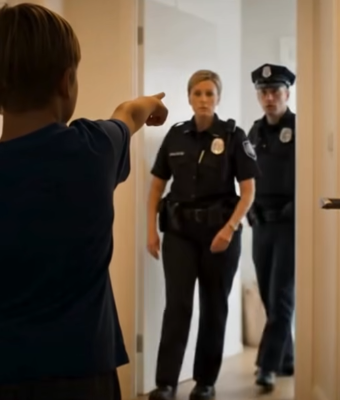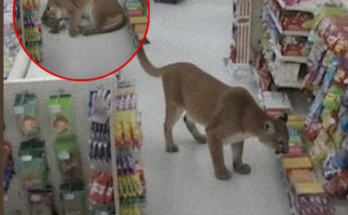It was supposed to be a joke.
She took my Xbox after I yelled during a game, and I told her I’d call the police for “stealing my property.” She laughed and said, “Go ahead. Tell them I took your pizza too while you’re at it.”
I didn’t think she meant actually go ahead.
But I was mad. Not regular mad—like red-in-the-face, can’t-feel-my-hands mad. So I grabbed her phone while she was folding laundry and said the first thing that came to mind to the operator: “My mom took something that belongs to me.”
I think I hung up before they finished asking questions. Ten minutes later, I heard a knock at the door.
Two officers. A woman and a man. Calm voices, clipped badges, and this serious look like they weren’t here for a noise complaint.
I froze. Mom asked who was at the door and I couldn’t even answer. I just backed up and pointed down the hall. The same hall she’d just walked into with the laundry basket.
The officers stepped inside, slowly. No yelling. No handcuffs. Just firm voices and quiet shoes on hardwood. I followed behind, my heart pounding so loud I thought they could hear it.
When we reached the hallway, Mom turned around, confused. “Can I help you?” she asked.
The woman officer looked from her to me, then said, “Ma’am, we got a call from this address. Your son reported—”
But before she could finish, the officer behind her noticed something on the floor just inside my room. He stepped forward, knelt down, and picked it up.
And what he said next made Mom’s face go pale.
“Is this blood?”
I stared at the floor. I didn’t even notice it before.
But he was right. There was a small smear, reddish-brown, right near the edge of my carpet. Mom looked at me, eyebrows furrowed. “Did you cut yourself again?”
I nodded slowly. My voice caught in my throat. “I think… yesterday.”
The woman officer stepped in. “We still need to ask you a few questions, ma’am. Can we sit down?”
Mom nodded, but her face had changed. She looked like someone had pressed pause on her expression.
The next hour was a blur. They asked if there was any violence in the house, if she ever punished me physically, if I felt safe here. Every time I tried to speak, my throat felt tighter. And Mom—she didn’t say much. She just sat there, her fingers twisting the hem of her sweatshirt.
Eventually, they left. No arrest. No warnings. But they said “we might follow up,” and I saw how Mom’s shoulders sank when the door finally shut.
That night, she didn’t yell. She didn’t say anything.
She made dinner like normal. Stir-fry. My favorite. But when she put the plate in front of me, her hands were shaking.
I stared at the food. “Mom,” I said, “I didn’t mean—”
“I know,” she said, cutting me off. Her voice was soft. “But they still came.”
That hit hard. I wanted to apologize, but the words felt too small.
I thought it’d blow over. But something changed after that day.
She stopped taking my stuff when I misbehaved. She stopped saying “no” with that playful tone. Instead, she avoided me. Not cold, just… distant.
And me? I started noticing things I hadn’t before.
Like how often she worked. Like how she stayed up late going through bills, her lips pressed tight, calculator in hand. How sometimes she’d sit in the car after work and just… cry.
I used to think she was being dramatic when she talked about stress.
But now, I saw it everywhere. In her posture. Her silence. The way she’d forget what she was saying mid-sentence.
One day, about two weeks later, I came home from school and found her shoes still by the door. But the car wasn’t in the driveway.
She was on the couch. Eyes closed. One arm draped over her stomach.
And there were pill bottles on the coffee table.
I called 911. My hands shook worse than they had the day I called about the Xbox.
Turns out, it wasn’t an overdose. Just exhaustion and some strong sleep meds. But that moment—seeing her like that—broke something in me.
I sat next to her until the ambulance came. I held her hand even when the paramedics moved around her.
When she woke up the next day in the hospital, she looked at me like she didn’t know whether to smile or cry.
“Hey,” I whispered.
She nodded. “Hey.”
There was a pause.
“You called,” she said, voice raspy.
I nodded. “This time it was serious.”
She gave a weak laugh. “I’m glad you knew the difference.”
That night, we talked. Really talked. For the first time in years, maybe.
She told me things I never knew.
How Dad left her with three months’ rent overdue. How she worked double shifts at the diner to keep us afloat. How she’d sold her engagement ring to buy me a new bike for my 10th birthday. How she didn’t eat dinner some nights so I could have seconds.
And then she said something that stuck with me.
“You’re not a bad kid,” she said. “But sometimes I wonder if I did something wrong. Maybe I tried too hard to give you everything I didn’t have.”
That hurt in a way I didn’t expect.
Because I realized then—I wasn’t angry about the Xbox. I was angry because I felt invisible. Because school sucked. Because I didn’t know how to talk about the pressure I felt to be someone. And because deep down, I was scared she’d give up on me the way Dad gave up on us.
After she came home, things didn’t magically get better.
We argued. We still had bills. But something shifted.
We started going on walks together after dinner. She helped me with homework again. I offered to do the dishes without being asked. I even got a part-time job at the corner store to pitch in.
And that Xbox? I sold it. Used the money to buy her a weighted blanket and a new coffeemaker.
“Is this a bribe?” she joked.
“No,” I said. “It’s interest. On everything I took for granted.”
By the time summer rolled around, we had our rhythm back.
Then came a twist we didn’t expect.
One evening, a knock at the door. It was the woman officer from before. She said she’d been checking in unofficially, just to see how we were doing.
Mom invited her in. I poured her tea.
When she left, she turned to me and said, “You’ve grown up a lot since last time.”
I smiled. “Trying.”
That week, I applied for a youth community program she mentioned. Mentorship, conflict resolution, all that stuff.
A year later, I was speaking at schools about emotional control and how one impulsive decision can change your life.
It’s funny, right? The call that almost tore us apart ended up being the thing that brought us closer. It forced both of us to pause, to see the cracks we were ignoring.
I don’t know what would’ve happened if I never made that call. Maybe nothing. Maybe something worse.
But here’s what I do know:
Sometimes, a mistake can be a mirror. It shows you who you are—and who you could be if you’re brave enough to own it.
So, yeah. I called the cops on my mom. And they showed up.
But what showed up after—patience, understanding, growth—that’s what changed everything.
If you’ve ever had a moment where you thought you messed up beyond repair, just know this: it’s not always the end. Sometimes it’s the beginning.
If this story made you think about someone in your life, share it. You never know who might need to hear it too. And don’t forget to like if it hit home.



